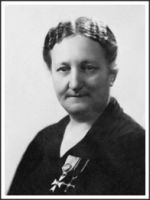Zofia Moraczewska
»I will always defend the freedom of conscience and freedom of personal beliefs as the most precious treasure of the free citizen in the reborn Poland « (Sophia Moraczewska)
Why I consider this woman to be an important person?
Moraczewska Sophia was one of the first women – members of parliament. As the only woman she was part of the Union of Polish Socialist Members. She fought for women to have their own political representation defending their interests, which will fight for the actual implementation of the principles of equality in Poland.
Biography
Sophia Moraczewska maiden name Gostowska was born on 4th of July 1873 in Czarnowce in Bukovina, in the Austro - Hungarian Empire, in an intellectual family. Sophia initially was taught at home. At age 12, she started attending a school for girls.
The atmosphere in the school had a great influence on the shaping of her the interests and ideological attitudes. It aroused feelings of patriotism and a passion for social work.
In 1893 she passed the test of maturity and started working as a teacher.
In 1896 she married Jędrzej Moraczewski. In the same year he joined the Polish Social Democratic Party of Galicia and Cieszyn Silesia
During the period of residence in the Stryj due to her initiative were established „Women's Association” and „Work” organizations that spread socialist and independence ideas and promoted cooperative principles.
Moraczewskies had four children: Tadeusz, Kazimierz, Adam and Wanda.
After the outbreak of World War I Moraczewska engaged in activities of the Women's League of Galicia and Silesia, set up in 1915 - the first mass organization for women on the Polish land, which had 16,000 members. 1916 she became its president and moved to Krakow. This organization became part of the Polish Women's League that was a pro-independence organization
It combined the struggle for independence with the struggle for women's rights and has played a significant role in the process of emancipation.
Activation of women during the war was to serve their becoming independent and to give women the right to acquire political rights after gaining independence.
Announcement of increased efforts for political equality of women met with reluctance from the representatives of the Catholic Church, who anxiously watched the mass women's organization successfully entering the field of public life reserved only for men.
After Poland regained its independence in November, 1918r.and women were granted political rights to the Moraczewskies moved to Warsaw. In January 1919 Moraczewska was selected member of the Polish Parliament on behalf of the Polish Socialist Party.
In 1920, she suffered a personal tragedy, her son, Kazimierz, as a17 year old volunteer was killed on the Polish-Bolshevik front.
Sophia became the head of the Democratic Election Committee of Polish Women in December 1927, which from her initiative was transformed into the Association of Women's Civic Work. It quickly became the largest women's organization in the country.
The association was designed to prepare women for independent social and political work and to overcome their fear of engaging in public activities. Thanks to her efforts the representatives of the association became part of government’s delegations to sessions of the International Labour Office, the sessions of the League of Nations in Geneva in 1931, and the Conference on Disarmament in Geneva in 1932.
In 1933 due to the deepening ideological differences in DECPW, Moraczewskies resigned from the position of President and with a group of co-workers withdrew from the organization.
In 1935 she founded the Women's Social Self-Help, which was to work among the female workers.
During World War II she was a member of the board of directors of the Consumer Cooperative „Together” in Sulejówek / where she lived from 1920 / and the organizer of the Citizens' Committee which helped the victims of war.
She survived another tragedy: her son Adam
in 1941 and daughter Wanda in 1942 died
in a concentration camp at Auschwitz.
In 1944 a
Soviet soldier’s stray bullet killed
her husband Jędrzej.
After the war she
didn’t get involved in public
life. From 1947 she worked on
arranging of the family archives and
prepared for printing the Encyclopedia
Polish women's movement.
She died on 16 November 1958 in
Sulejówek.
Bibliography
- Dufrat Joanna, Kobiety w kręgu lewicy niepodległościowej. Od Ligi Kobiet Pogotowia Wojennego do Ochotniczej Legii Kobiet (1908-1918/1919), Toruń 2001.
- Moraczewska
Zofia, Związek Pracy Obywatelskiej Kobiet, Warszawa 1933.
Głos Kobiet (1919-1927) - Moraczewska Zofia, Mój testament pisany do ogółu kobiet polskich w roku 1945, Wrocław 1946.
Links
- http://pl.wikipedia.org/wiki/Zofia_Moraczewska (dostępna 27.05.2013)
- http://www.feminoteka.pl/muzeum (dostępna 27.05.2013)
- Tomasz Kowalik, Baby na Wiejskiej, Biuletyn Ministerstwa Nauki i Szkolnictwa Wyższego 12/2004 (dostępna 27.05.2013)
Picture source:
Library of Polish Parlament, http://pl.wikipedia.org/wiki/Plik:Moraczewska1.jpg Rights: PD




